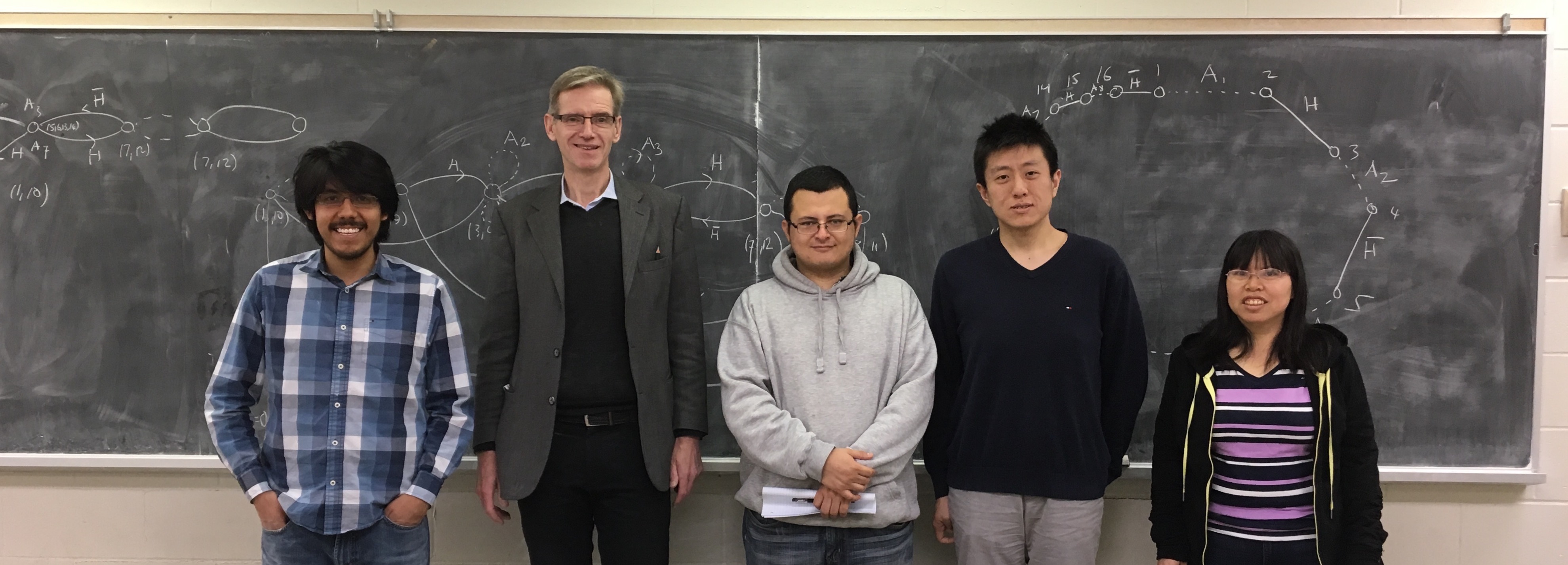
Thursday, September 6, 2:30 - 4:00, Jeff 222
On the Fluctuations of Block Gaussian Matrices, IV
This is a continuation of my previous talk.
Thursday, September 1, 1:30 - 3:00, Jeff 222
On the Fluctuations of Block Gaussian Matrices, III
This is a continuation of my previous talk.
Thursday, August 30, 1:30 - 3:00, Jeff 222
On the Fluctuations of Block Gaussian Matrices, II
This is a continuation of my previous talk.
Thursday, August 25, 1:30 - 3:00, Jeff 222
On the Fluctuations of Block Gaussian Matrices
In this talk we will extend a theorem of Mingo and
Nica to compute the matricial second-order Cauchy
transform of matricial-valued semicircular
elements. Then, the fluctuations of block Gaussian
random matrices will be obtained using this
transform. This is joint work with Serban Belinschi
and Jamie Mingo.
Wednesday, June 22, 3:30 - 5:00, Jeff 319
Octavio Arizmendi (CIMAT, Guanajuato)
The exponential map in non-commutative probability
The wrapping transformation W is a homomorphism from
the semigroup of probability measures on the real
line, with the convolution operation, to the semigroup
of probability measures on the circle, with the
multiplicative convolution operation. We show that on
a large class L of measures, W also transforms the
three non-commutative convolutions—free, Boolean,
and monotone—to their multiplicative
counterparts. Moreover, the restriction of W to L
preserves various qualitative properties of measures
and triangular arrays. We use these facts to give
short proofs of numerous known, and new, results about
multiplicative convolutions. This is joint work with
Michael Anshelevich.
Wednesday, April 6, 1:30 - 3:00, Jeff 319
Analytic Properties of Certain Two-Variables Cauchy
Transforms
In this talk we will present some analytic properties
of certain two-variables Cauchy transforms. We will
also discuss how these properties are related to
questions about the existence of certain second-order
Cauchy transforms.
Friday, April 1, 10:00 - 11:30, Jeff 222
Josué Daniel Vázquez Becerra (Queen's)
Second order freeness, Hadamard matrices, and signed
permutation matrices, III.
This talk will conclude my presentation of my results
on second order freeness.
Thursday, March 17, 10:00 - 11:30, Jeff 222
Josué Daniel Vázquez Becerra (Queen's)
Second order freeness, Hadamard matrices, and signed
permutation matrices, II.
In this talk, we first show how to calculate the joint
distribution of the entries of a uniformly distributed
signed permutation matrix. Then, we explore the idea
of using Hadamard matrices and uniformly distributed
signed permutation matrices to deliver asymptotic
freeness of second order. This is a continuation from
March 10.
Thursday, March 10, 10:00 - 11:30, Jeff 222
Josué Daniel Vázquez Becerra (Queen's)
Second order freeness, Hadamard matrices, and signed
permutation matrices.
In this talk, we first show how to calculate the joint
distribution of the entries of a uniformly distributed
signed permutation matrix. Then, we explore the idea
of using Hadamard matrices and uniformly distributed
signed permutation matrices to deliver asymptotic
freeness of second order.
Thursday, February 11, 10:00 - 11:30, Jeff 222
Bi-free Independence, II
Free independence is an analogue of classical
independence where tensor products are replaced by
free products. The parallel between the two theories
run quite deep and extends to both the analytic and
combinatorial approaches to independence. Recently a
model was found where free and tensor independence can
co-exist on the same space. Moreover other notions of
independence make sense in this model. This is a
continuation from January 21.
Thursday, February 4, 10:00 - 11:30, Jeff 222
Quanyuan Chen (School of Information and
Engineering, Jingdezhen Ceramic
Institute)
Generalized derivations on CSL subalgebras of von
Neumann algebras
We extend existing results that study when Jordan
derivations are derivations. Under a mild condition,
it is shown that a Jordan $(α,β)$-derivation on a CSL
subalgebra of a von Neumann algebra is an
$(α,β)$-derivation. It is shown that a Jordan
$(α,α)$-derivation on a CSL subalgebra of a von Neumann
algebra is an $(α,α)$-derivation, where $α,β$y are
automorphisms on a CSL subalgebra of a von Neumann
algebra. We also investigate the generalized $n$-th
power maps on CSL subalgebras of von Neumann algebras.
Thursday, January 28, 10:00 - 11:30, Jeff 222
On the Symmetries of Multiantenna Channels
We will review some of the results given in a previous
talk.
Then we will discuss recent developments and
further applications.
Thursday, January 21, 10:00 - 11:30, Jeff 222
Bi-free Independence
Free independence is an analogue of classical
independence where tensor products are replaced by
free products. The parallel between the two theories
run quite deep and extends to both the analytic and
combinatorial approaches to independence. Recently a
model was found where free and tensor independence can
co-exist on the same space. Moreover other notions of
independence make sense in this model. I will review
some of my recent results and indicate where further
progress might be made.
Previous Schedules
Getting to Jeffery Hall from the Hotel Belvedere


